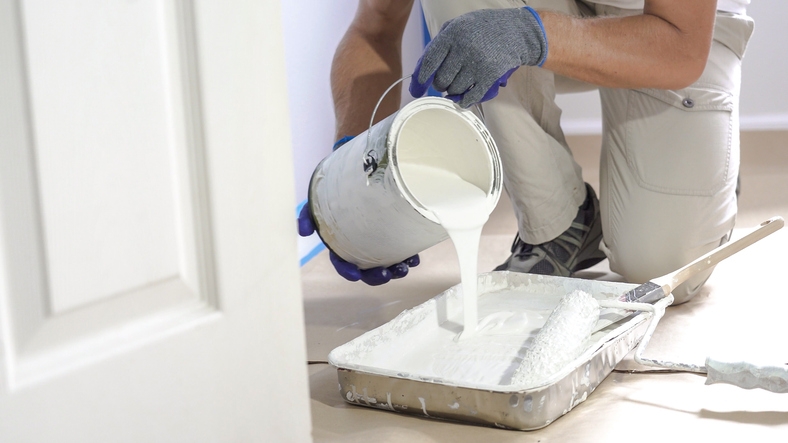Residential painting is more than just applying color to walls. It involves careful planning, preparation, and execution to achieve a beautiful and lasting finish.
Understanding the basics of residential painting helps homeowners make informed decisions and ensures that their homes look their best. Read on as we cover the key aspects of residential painting, from selecting the right materials to choosing professional painters.
What is Residential Painting?
Residential painting involves painting the interior and exterior surfaces of homes. It covers a wide range of areas, including walls, ceilings, doors, windows, trim, and sometimes floors. The goal is to improve the appearance and protect the surfaces from damage caused by weather, moisture, and wear.
Professional residential painters use various techniques and materials to achieve a quality finish. They prepare surfaces by cleaning, sanding, and priming to ensure the paint adheres properly. Different types of paint, such as latex, oil-based, and specialty coatings, are chosen based on the surface and the desired result.
Interior painting focuses on the inside of the home. This includes living rooms, bedrooms, kitchens, and bathrooms. Color choices and finishes play a major role in setting the mood and style of each room. Exterior painting deals with the outer surfaces like siding, trim, and doors. It helps protect the home from the elements while enhancing its curb appeal.
Differences Between Residential Painting and Commercial Painting
Residential and commercial painting have key differences that are important to understand. These differences affect the approach, materials, and techniques used in each type of project. Here are the distinctions:
Scope and Scale
Residential painting projects are usually smaller in scale compared to commercial ones. They involve painting individual homes or apartments.
Commercial painting covers larger areas such as office buildings, malls, and schools. The size of the project often dictates the resources and time required.
Materials and Equipment
The materials and equipment used in residential painting differ from those in commercial painting. Residential projects often use standard paints and tools suitable for home environments. Commercial projects may require specialized coatings and industrial-grade equipment to handle larger surfaces and higher durability needs.
Scheduling and Timing
Residential painting projects are usually more flexible with scheduling. Homeowners can choose times that are convenient for them.
Commercial painting often needs to be done outside of business hours to avoid disrupting operations. This may include nights or weekends to accommodate the business’s schedule.
Safety and Regulations
Commercial painting projects are subject to stricter safety regulations and codes. Painters must follow specific guidelines to ensure the safety of workers and the public. Residential painting also requires safety measures but usually involves fewer regulatory requirements.
Project Management
Managing a residential painting project is often simpler, with fewer logistical challenges. Commercial painting projects typically involve more complex planning and coordination. They may require managing multiple teams and adhering to strict deadlines to meet business needs.
When Will You Need Residential Painting?
Residential painting is necessary for various reasons. Below are the common situations when you might need residential painting:
- Wear and Tear: Over time, walls and surfaces get scuffed, chipped, or faded. A fresh coat of paint can revive the appearance of your home.
- Home Renovations: When renovating or remodeling, painting is often required to match new designs and color schemes.
- Preparing to Sell: A newly painted home can attract buyers and increase your property’s market value. It gives a clean and well-maintained look.
- Changing Styles: Tastes and trends change over the years. Updating your home’s color scheme can reflect your current style and preferences.
- Damage Repair: Water damage, mold, or other issues might require repairing and repainting affected areas to restore your home.
- New Home Purchase: When moving into a new house, painting is often needed to personalize the space and make it feel like home.
Hiring Professional Painters for Residential Painting
If you need residential painting services for your home, then you will need to hire the best professional painters in your area. Here are several tips to help you find the best painters for your project:
Research and Recommendations
Start by asking friends, family, and neighbors for recommendations. Look for painters with good reviews and a solid reputation. Online platforms and local community boards can also provide useful information.
Check Credentials
Make sure the painters are licensed and insured. This protects you from potential liabilities and ensures the painters have met professional standards. Verify their credentials before making a decision.
Get Multiple Quotes
Obtain quotes from several painters to compare prices and services. This helps you understand the market rate and ensures you are getting a fair deal. Be wary of quotes that are significantly lower than others.
Review Portfolios
Ask to see examples of the painters’ previous work. A portfolio showcases their skills and the quality of their finishes. This gives you an idea of what to expect for your own project.
Ask for References
Request references from past clients. Contact them to ask about their experience with the painters. This provides insight into the painters’ reliability and workmanship.
Discuss the Scope of Work
Clearly outline the details of your project with the painters. Discuss the surfaces to be painted, the type of paint to be used, and the expected timeline. This ensures everyone is on the same page.
Read the Contract
Before hiring, carefully read the contract. Make sure it includes all agreed-upon details, such as cost, timeline, and specific services. A well-defined contract helps prevent misunderstandings and disputes.
Conclusion
Understanding residential painting involves knowing the basics of preparing and painting both the interior and exterior of your home. It includes choosing the right materials, hiring professional painters, and maintaining the painted surfaces to keep your home looking its best.
For expert residential painting services, contact Custom Painting, Inc. Call us at 925-866-9610 or fill out a Contact Form for more information.




